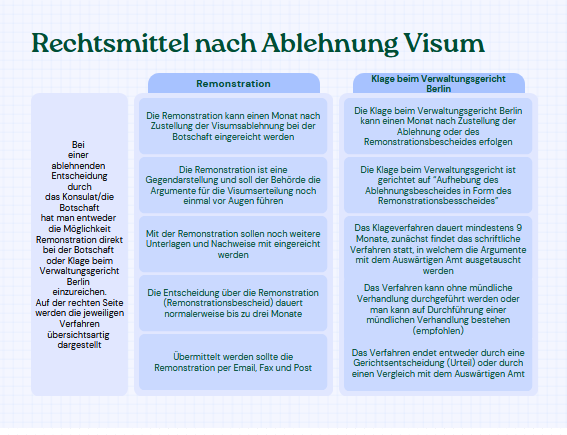Case Background
The plaintiff, an Afghan national born in 1998, applied for a visa for family reunification with his father, who has been living in Germany with humanitarian residency since 2021. The application was rejected by the competent German embassy in Tehran on May 7, 2023. The plaintiff, who reportedly lived in precarious conditions in Iran and later in Turkey, filed a lawsuit against this decision. He argued that he was entitled to family reunification due to the imminent threat of persecution by the Taliban in Afghanistan, as well as the precarious living conditions in Iran and Turkey.

Court Decision
The Administrative Court ruled that while the plaintiff’s lawsuit was admissible, it was unfounded. The embassy’s decision was lawful, and the plaintiff had no right to be granted the visa. The court determined that the requirements for family reunification under Section 36(2) of the Residence Act (AufenthG) were not met. Since the plaintiff is an adult, he is considered an „other family member,“ and an exceptional hardship would need to be proven for a visa to be issued. However, such hardship was not substantiated.
Examination of Exceptional Hardship
The court stated that exceptional hardship under Section 36(2) of the Residence Act exists only in rare cases where the family member in need of protection is urgently dependent on family support. The plaintiff is capable of leading an independent life and has shown that he can manage in difficult situations, such as by working in a tailor shop in Turkey. The poor economic and political conditions in Afghanistan were also insufficient to establish exceptional hardship.
Rejection of a Claim Based on Humanitarian Grounds
The court also examined whether the plaintiff had a claim for a visa on urgent humanitarian grounds under Section 22 of the Residence Act. However, it was determined that there was no discretion reduction to zero, and the defendant’s decision to grant residence permits only to the father’s minor children was justified. The plaintiff’s mother’s potential health impairment, which might have justified such a claim, was neither sufficiently substantiated nor supported by medical certificates.
Consideration of Cultural and Family Aspects
The court rejected the argument presented by the second intervenor that it is customary in the Afghan cultural context for parents to remain responsible for their children until marriage, regardless of age. These cultural customs cannot replace the legal requirements for family reunification of adult relatives. The plaintiff’s interest in joining his family in Germany also did not justify an exception to the strict legal requirements.
Overall Assessment and Final Decision
In the overall assessment of the circumstances, the court noted that the plaintiff and his family theoretically had the possibility of achieving reunification through the Berlin state program for Afghan refugees. However, it was unclear why no efforts were made to secure the family’s livelihood independently. As there were no grounds for exceptional hardship and no claim on humanitarian grounds, the court dismissed the lawsuit.
Conclusion
The Administrative Court clarified that family reunification for adult children is only possible under very strict conditions. In this case, neither the political and economic conditions in Afghanistan nor the plaintiff’s precarious living situation in Turkey were sufficient to establish exceptional hardship or urgent humanitarian grounds. Therefore, the application for family reunification was denied.
Important Note: The content of this article has been prepared to the best of our knowledge and belief. However, due to the complexity and constant evolution of the subject matter, we must exclude liability and warranty. Important Notice: The content of this article has been created to the best of our knowledge and understanding. However, due to the complexity and constant changes in the subject matter, we must exclude any liability and warranty.
If you need legal advice, please feel free to call us at 0221 - 80187670 or send us an email at or send an email to info@mth-partner.de info@mth-partner.de
Lawyers in Cologne advise and represent clients nationwide in immigration law.

